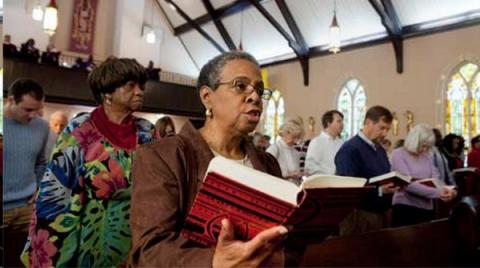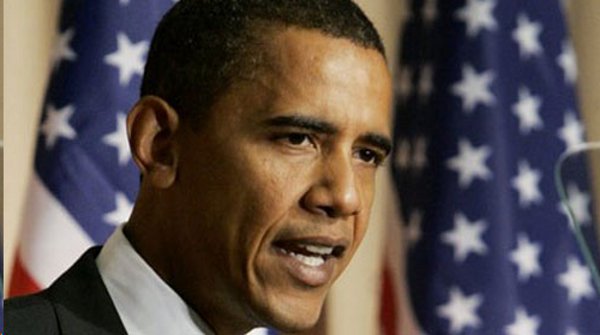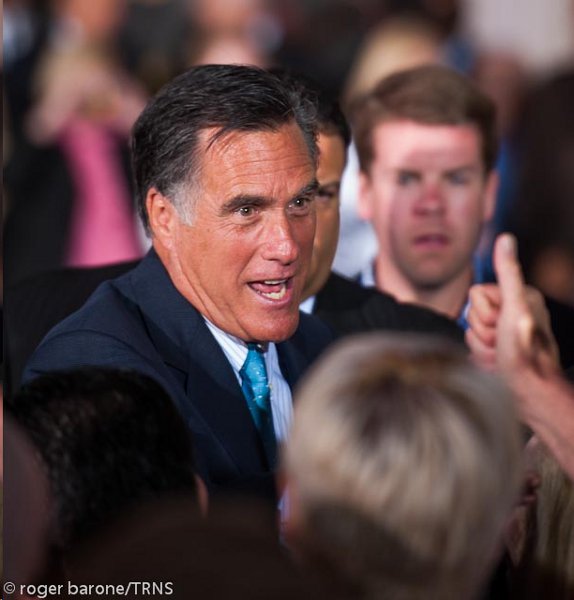African-American Catholics Face Dilemma: Whether to Vote for Obama

From New America Media and the North Star News:
Black Catholics confront a moral dilemma in the upcoming presidential election: vote with their church or vote with the party that they have long preferred to keep the first African-American president in office four more years.
Three million black Catholics lived in the United States as of 2005, according to the Catholic African World Network, a fraction of the 44 million African Americans counted by the U.S. Census Bureau in 2011. (However, people of African descent constitute one-fourth of the world’s one billion Catholics.)
While African-American Catholics are relatively few in number, they may represent enough of the black vote to make a difference in the outcome if they choose to bestow or withhold their support.
Obama took 96 percent of the black vote in 2008, according to exit polls. In 2012, the question for black Catholics is whether to vote black or Catholic? That is hard to say, but a recent survey suggests that black Catholics identify as Catholics even more than white Catholics do. The 2011 National Black Catholic Survey found that black Catholics were more religiously “engaged” by significant margins than white Catholics were and identify strongly with the church. As evidence of that, it found that 48.2 percent of African American Catholics attend church at least once a week, compared to 30.4 percent of white Catholics.
With most national polls showing the two leading party nominees a hair’s breadth apart in mid-October, Catholics as a whole are seen as an increasingly crucial slice of the pie, representing a quarter of the electorate and generally concentrated in swing states. According to NPR, “since 1972, every single presidential candidate who has won the popular vote has also won the Catholic vote.
Catholics were once reliably Democratic as a bloc, when they were largely urban, ethnic, immigrant, working-class and shunned. As their offspring have become increasingly suburban, white-collar, and mainstream, they have become increasingly conservative and Republican. In 2008, Obama captured the Catholic vote, 54 percent to John McCain’s 45 percent. Four years earlier, George W. Bush took 52 percent and John Kerry 47 percent, according to the Pew Forum on Religion and Public Life.
Many Catholics and the Roman Catholic Church hierarchy part company with Obama for his support of pro-choice positions, same-sex marriage and requirements that religious institutions provide employees insurance coverage for contraception. At the same time, many in the church have expressed concern over how well Romney’s plans for budget cuts and tax cuts for the rich would square with the church’s teachings on social justice and the common good.

Breaking Bread Together
In spite of the candidate’s political views, Cardinal Timothy Dolan of New York, as is customary, invited both contenders to address the Annual 67th Annual Alfred E. Smith Memorial Foundation Dinner last Thursday (Oct. 18), where the candidates traded friendly barbs. They steered clear of the Catholic hot-button issues but praised the work of the church. It was the first time a sitting president actually had spoken at the dinner since Ronald Reagan did so in 1984.
The Cardinal said in a blog that he received bags of mail protesting the invitation to the President, and some protesting the invitation of Romney. Cardinal Dolan defended his decision to continue a tradition that fosters public civility, engagement and dialogue for the benefit of charity. At the dinner, he sat between Romney and Obama, talking and laughing with them. The dinner, which benefits several charities that focus on children’s needs, is named for New York Gov. Al Smith, who in 1928 became the first Catholic nominated to run for President and lost to Herbert Hoover.
Meanwhile, the media have paid much attention to the fact that the two vice-presidential candidates, Joe Biden, the Democrat, and Paul Ryan, the Republican, are Catholic, and their recent debate brought their differing views on abortion to the forefront.
Asked how their Catholic faith had affected their views on abortion, Biden and Ryan split. Emphasizing that he believes life begins at conception, Ryan said he was opposed to abortion, except in cases of rape, incest, or danger to the mother's life. That is a more liberal view than he has expressed in the past and a more permissive one than the church teaches. The Catholic church does not condone those exceptions.

Biden injected Catholic social teachings into the abortion discussion, saying first that the doctrine “talks about taking care of those who -- who can’t take care of themselves, people who need help.” He added that he personally agreed with the church's position on abortion, but he did not favor making that public policy.
“I do not believe we have a right to tell women that they can't control their body,” Biden said. “It's a decision between them and their doctor.”
Straight From the Gospel
Catholic social doctrine basically derives from Jesus Christ’s declaration that he was sent “to preach the gospel to the poor… to proclaim release to the captives, And recovery of sight to the blind, to set free those who are oppressed,” (Luke 4:18- NASB), as well as from his instructions to care for the hungry, thirsty, stranger, naked, sick, homeless and imprisoned. “To the extent that you did it to one of these brothers of Mine, even the least of them, you did it to Me. (Matthew 25:40 NASB.) Thus, Catholic social teachings focus on issues of poverty and wealth, economics, social organization and the role of government.
In keeping with that, Catholic leaders have taken issue with Ryan’s budget-cutting proposals.
Just prior to the Romney-Ryan debate, the Center for Applied Research in the Apostolate (CARA) at Georgetown University, a nonprofit research center, pointed out that it would be “the first with two Catholic candidates from opposing parties meeting in a televised national election forum.”
“As they meet,” CARA said, “the ‘Catholic vote’ is back to ‘too close to call’ with President Obama leading among all Catholic registered voters (49 percent Obama to 45 percent Romney) and Gov. Romney leading among all likely Catholic voters (50 percent Romney to 44 percent Obama).”
A Pew Research Center report in August said, “about half of Catholic voters (51 percent) say Barack Obama best reflects their views on social issues such as abortion and gay rights; 34 percent say Mitt Romney best reflects their views on these issues. Obama’s lead on social issues among Catholics is about as wide as his lead among all voters (50 percent to 36 percent).”
These figures indicate Catholic followers do not always side with the church’s positions. In August, the Obama campaign unveiled its “Catholics for Obama” team, a 21-member group of prominent Catholics that includes Sister Jamie T. Phelps, a professor of systematic theology and director of the Institute for Black Catholic Studies at Xavier University in New Orleans. As such, she is probably one of the most visible, respected black Catholic leaders in the United States.
On the www.BarackObama.com website, “Catholics for Obama” said: “We endorse the President because of his tireless focus on economic security for middle-class families… Despite inheriting the worst economic crisis in a generation, the President extended unemployment insurance to those hit hardest, providing a lifeline for millions of our nation's families. And, after a decades-long struggle, President Obama signed into law health reform that enhances the security and welfare of every American family.”
“We are proud of the President for his opposition to the budget proposed by Rep. Paul Ryan, embraced by Republicans in Congress, and heartily endorsed by Mitt Romney,” the team said. “The Republican plan would shred our nation’s compassionate safety net, gutting Medicare, food assistance programs, Head Start, and many other programs—all while cutting taxes for the wealthy.”
Some black protestant leaders have urged their constituents to stay home on Election Day, largely because of the same-sex marriage issue. In contrast, at a national gathering of black Catholics this summer, a prominent black bishop warned 3,000 of the faithful not to abandon their “essential participation in democracy and become a part of the sad statistic of nearly 45 percent of Americans who are eligible to vote in a presidential election and abdicate this important civic and Christian duty.”
“No matter how flawed you may think the candidates are, you have an obligation to participate,” Bishop Edward K. Braxton of Belleville, Ill., said at the opening Mass of the 11th National Black Catholic Congress on July 19 in Indianapolis.
“Both candidates are imperfect human beings,” he said. “The American political system does not produce saviors for the nation or knights in shining armor who fulfill all of our hopes and expectations. Neither President Obama nor former Governor Romney espouses positions consistent with the teachings of the Catholic Church on important moral, social, and economic issues.”
Scorecard on the Issues
Delineating the pros and cons of each candidate and choosing his words with care, he continued: “There are voices that suggest that, as African-Americans, we are all good Democrats and will most certainly vote in huge numbers for the re-election of ‘one of our own,’ the first Black President. It is argued that we will do this even if, as committed Catholics, we are profoundly disturbed by positions taken by the President on fundamental issues such as the dignity of every human life, the immutable nature of marriage, and the right of the Catholic Church to enjoy the free exercise of religion in the public square.”
“These voices suggest that we will vote as Democrats,” he continued, “because we see the President's efforts to bring the nation out of the greatest recession since the Depression, his unrelenting efforts to increase the level of employment, his tireless efforts to end deadly and unpopular wars in Iraq and Afghanistan, and his bold efforts to eliminate terrorists.”
The bishop said other voices suggest, “We should vote for Mr. Romney because his positions are more consistent with the teachings of the church on the sanctity of developing human life in the womb. … But there are still other voices. These voices suggest that we should find it just as difficult to vote for Mr. Romney…. His views on economic reform in a time of crisis, his understanding of how capitalism works, and his unwillingness to raise the taxes of our wealthiest citizens, seem to favor those who enjoy his exceptional level of wealth and penalize the middle class and the very poor, who are often African-American and Hispanic. This seems to show very little empathy for the neediest Americans.”
Despite the Bishop’s attempts at evenhandedness, some members of the audience -- which appeared to be about 99 percent black -- shouted “boo” with each mention of Romney. The audience had also booed at the idea of not voting. Braxton received a standing ovation and cheers, but some among the crowd were heard questioning whether the mention of politics was appropriate for the occasion.
Later in the service, Bishop Braxton reiterated that he was not telling church members how to vote, but admonished:
“Make sure you are registered to vote. Take the time needed to study carefully the positions of the contenders. Read, think, discuss, dispute, decide, read, discuss, debate some more, pray to the Holy Spirit for guidance, reconsider your decision and VOTE.”
Author Bio:
Angela P. Dodson, a freelance editor and consultant in New Jersey, is the host for a radio program, “Black Catholics, Yes!”
Photos: New America Media; Roger Barone (TRNS - Creative Commons).






























































































































































































































































































































